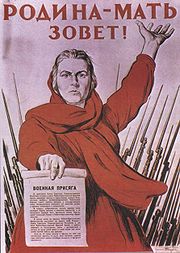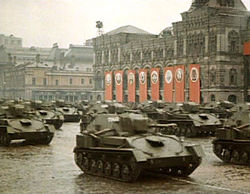Great Patriotic War (term)

The term Great Patriotic War (Russian: Вели́кая Оте́чественная война́, Velíkaya Otéchestvennaya Voyná, Ukrainian: Велика Вітчизняна війна, Velyka Vitchyznyana Viyna[1]) is used in Russia and some other states of the former Soviet Union to describe the portion of World War II from June 22, 1941, to May 9, 1945, against Nazi Germany and its allies in the Eastern Front. The term is not generally used outside the former Soviet Union (see Eastern Front). It is a patriotic and symbolic term. During this period 6.8 million Soviet soldiers were killed and 4.4 million died in captivity.[2] The Soviet Union lost 26.6 million men and women in total.[3]

There is a difference between this phrase and World War II or the Second World War, as the Russian term denotes only the war between Germany and its European allies, and the Soviet Union. The war with Japan (including the invasion of Manchuria) and the war on the Western front are not referred to by this term. Nor does it cover the Soviet Union's 1939 attacks on Poland and Finland.
The term was coined following the German attack against the Soviet Union on June 22, 1941 and was intended to motivate the population to defend the Soviet motherland and to expel the invader. Earlier, the term Patriotic War referred to the French invasion of Russia under Napoleon I, which is now known as the Patriotic War of 1812. The term denotes a war for the patria - the fatherland.
The term Great Patriotic War appeared in the Soviet newspaper Pravda soon after Nazi Germany invaded the Soviet Union, in a long article titled “The Great Patriotic War of the Soviet People” (Velikaya Otechestvennaya voyna sovetskogo naroda).
During the conflict, the Soviet Union created the Order of the Patriotic War, awarded for heroic deeds.
See also
- First period of World War II
- Second period of World War II
- Third period of World War II
- Second Fatherland War
- Pobediteli
Footnotes
- ↑ Belarusian: Вялікая Айчынная вайна; Uzbek: Улуғ Ватан уруши; Kazakh: Ұлы Отан соғысы; Georgian: დიდი სამამულო ომი; Azerbaijani: Бөјүк Вәтән мүһарибәси; Lithuanian: Didysis Tėvynės karas; Moldovan: Мареле Рэзбой пентру апэраря Патрией; Latvian: Lielais Tēvijas karš; Kyrgyz: Улуу Ата Мекендик согуш; Armenian: Մեծ Հայրենական պատերազմ; Turkmen: Бейик Ватанчылык уршы; Estonian: Suur Isamaasõda; Tatar: Бөек Ватан сугышы
- ↑ http://www.soldat.ru/doc/casualties/book/chapter5_08.html
- ↑ http://www.soldat.ru/doc/casualties/book/chapter5_13_11.html
External links
|
|||||||||||||||

